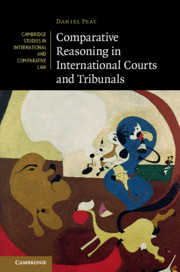Book contents
- Comparative Reasoning in International Courts and Tribunals
- Cambridge Studies in International and Comparative Law: 145
- Comparative Reasoning in International Courts and Tribunals
- Copyright page
- Contents
- Foreword
- Preface
- Table of Cases
- Table of Treaties
- Abbreviations
- 1 Introduction
- 2 The Limits of the Vienna Convention
- 3 Domestic Law in the Jurisprudence of the International Court of Justice
- 4 The Interpretation of Schedules of Commitments in the WTO
- 5 International Investment Law and the Public Law Analogy
- 6 Consensus Doctrine in the European Court of Human Rights
- 7 Domestic Law and System Building in the ICTY
- 8 Conclusion
- Bibliography
- Index
- Cambridge Studies in International and Comparative Law
2 - The Limits of the Vienna Convention
Published online by Cambridge University Press: 24 May 2019
- Comparative Reasoning in International Courts and Tribunals
- Cambridge Studies in International and Comparative Law: 145
- Comparative Reasoning in International Courts and Tribunals
- Copyright page
- Contents
- Foreword
- Preface
- Table of Cases
- Table of Treaties
- Abbreviations
- 1 Introduction
- 2 The Limits of the Vienna Convention
- 3 Domestic Law in the Jurisprudence of the International Court of Justice
- 4 The Interpretation of Schedules of Commitments in the WTO
- 5 International Investment Law and the Public Law Analogy
- 6 Consensus Doctrine in the European Court of Human Rights
- 7 Domestic Law and System Building in the ICTY
- 8 Conclusion
- Bibliography
- Index
- Cambridge Studies in International and Comparative Law
Summary
On 12 January 2016, 10 sailors from the United States Navy accidently navigated into the Iranian territorial sea under the mistaken impression they were in Saudi Arabian waters. Within hours, Iran’s Islamic Revolutionary Guards had captured the vessels, seized 13,000 pages of intelligence from computers on board and detained the sailors. Unsurprisingly, Iran’s actions drew strong condemnation from US government officials. As in many warps of life, legal rules provided both the language and the standard against which the actions of Iran were assessed. Government and military officials did not criticise Iran’s actions as being unfair or unjust; instead, their comments focussed on the legality of Iran’s actions: some labelled it as an ‘outrageous’ act that was ‘inconsistent with international law’, whilst others called it an act in ‘apparent violation of international law and centuries of maritime custom and tradition’.
- Type
- Chapter
- Information
- Publisher: Cambridge University PressPrint publication year: 2019

